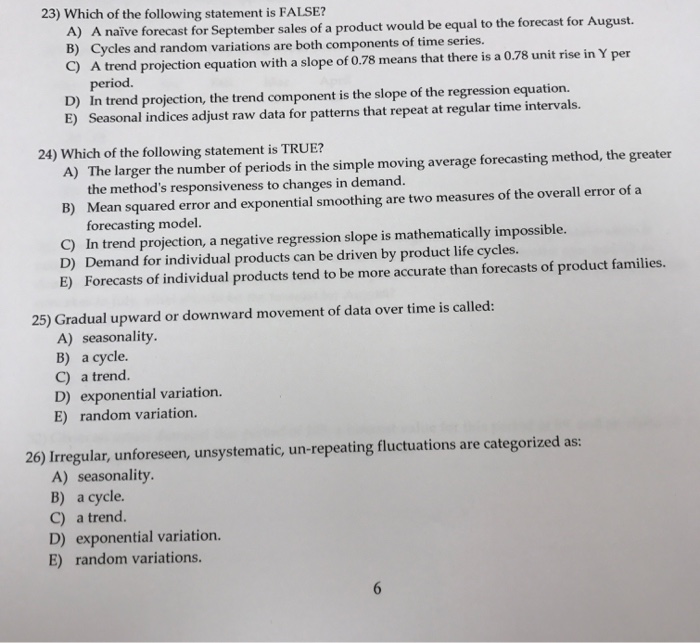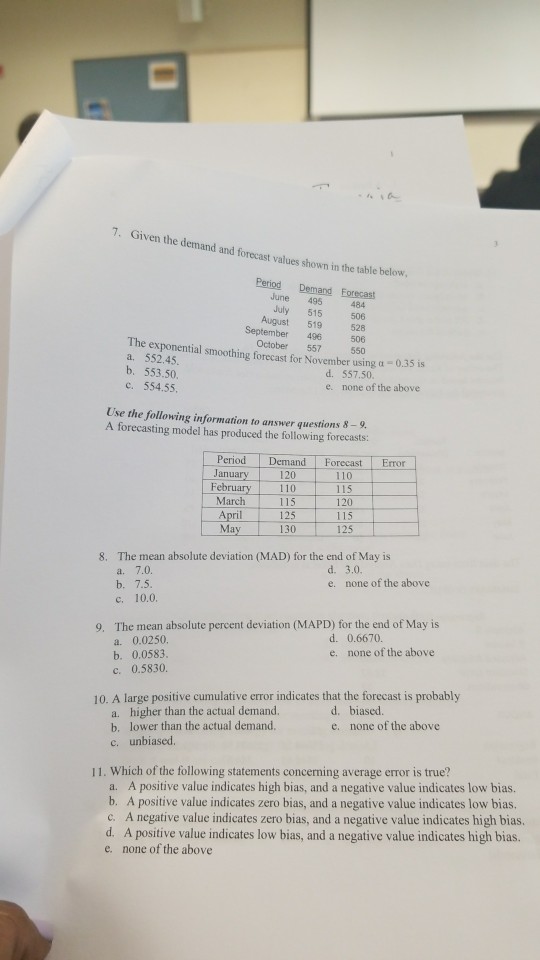Which of the following statements are true about time-series forecasting? A. Time series analysis is based on the idea that the history of occurrences over time can be used to predict the future. B. Time series analysis tries to understand the system underlying and surrounding the item being forecast. C.Which of the following statements are true? a. Forecasts are rarely perfect. b. Statistical models to forecast economic trends are called econometric models. c. The last-value forecasting method does not require a linear trend line. d. The moving-average forecasting method assigns equal weights to each value in the average. e. All of the aboveTRUE/FALSE. Write 'T' if the statement is true and 'F' if the statement is false. 1) A forecast is an accurate estimate of future demand. 1) _____ 2) Lenders require pro forma statements because they want to make sure the business will generate enough profit for the owner to get a large salary. 2) _____ 3)Which of the following statements are true? a. Judgemental forecasting methods have been developed to interpret statistical data. b. Once accepted by managers, forecasts should not be overridden.44) Which of the following statements are true about time-series forecasting? A. Time series analysis is based on the idea that the history of occurrences over time can be used to predict the future. B. Time series analysis tries to understand the system underlying and surrounding the item being forecast. C.
(Solved):Which of the following statements are true? a
All of the following statements are true regarding ratios and forecasts except: A) Ratios cannot confirm whether forecast assumptions will turn out to be correct. B) Ratios can tell whether future sales growth was accurately captured. C) Ratios cannot tell whether assumptions about future cash flows are realistic.This Question: 1 pt 7 of 15 (6 complete) Which of the following statements about forecasts is true? O A. Forecasts for individual items are more accurate than for groups of products. O B. Forecasts are no substitute for calculated values. OC. Forecasts for the long term tend to be more accurate than for near term. OD. Forecasts are almost41) Which of the following statements are true about time-series forecasting? A. Time series methods are useful for long-range forecasts when the demand pattern is erratic B. Time series analysis is based on the idea that the history of occurrences over time can be used to predict the future. C.(a) Both A and R are individually true and R is the correct explanation of A (b) Both A and R are individually true but R is not the correct explanation of A (c) A is true but R is false (d) A is false but R is true IES-4. Which one of the following forecasting techniques is most suitable for making long range forecasts?

Faculty Personal Web Page Listings - Texas A&M University
Which of the following statements about forecasts is true? A. Forecasts can be substituted for calculated values. B. Forecasts for individual items are more accurate than for groups of products.Which of the following statements about lines of authority and reporting are true? 1. The Project Manager has day-to-day control for a management stage within the limits laid, 2. If a Team Manager forecasts a deviation beyond Work Package tolerances, this should be referred to the Project Manager down by the Project Board. A. Only 1 is true. B.Which of the following statements about forecasts is true? Which of the following statements about forecasts is true? Forecasts for the near term tend to be more accurate. 23. The situation is stable and historical data exists, as in the case of mature products or technologies. In this case, which of the following forecasting approachs is used?John's House of Pancakes uses a weighted moving average method to forecast pancake sales. It assigns a weight of 5 to the previous month's demand, 3 to demand two months ago, and 1 to demand three months ago. If sales amounted to 1000 pancakes in May, 2200 pancakes in June, and 3000 pancakes in July, what should be the forecast for August?Which of the following statements are true concerning the class of ARIMA(p,d,q) models? 1. The "I" stands for independent. 2. An ARIMA(p,1,q) model estimated on a series of logs of prices is equivalent to an ARIMA(p,0,q) model estimated on a set of continuously compounded returns. 3.
"A set of business processes, backed up by means of information technology, in which provide chain companions agree to mutual trade goals and measures, expand joint gross sales and operational plans, and collaborate to generate and update sales forecasts and replenishment plans" is the definition of
Which one of the following is the True statement about ...

Solved: Which Of The Following Statements About Time-serie ...

Which Of The Following Is NOT A Forecasting Method ...

Finance Archive | July 03, 2017 | Chegg.com

(Solved) - Which of the following statement is FALSE? A ...

Finance Archive | February 19, 2017 | Chegg.com
Answer TRUE Diff 2 Topic MEASURES OF FORECAST ACCURACY 32 ...

Solved: MC Qu. 29 Which Of The Following Statements Is ...

Solved: 7. Given The Demand And Forecast Values Shown In T ...

Which of the following statements regarding cash flow is ...

Which of the following statement is NOT true regarding ...

Solved: MC Qu. 29 Which Of The Following Statements Is ...

Which one of the following statements about forecasting is ...

ch 8 - 1 Which of the following statements is(are best ...

33 Which Statement Regarding The Diagram Is True_ - Wiring ...

Which of the following statements is are true I ...

At The Moment T Depicted In The Diagram Which Of The ...

Which one of the following statements about forecasting is ...

Sales forecasts are typically higher than sales potential ...

Which of the following statements about a budgeted income ...

Which Of The Following Is True Regarding A Statement Of ...







No comments:
Post a Comment